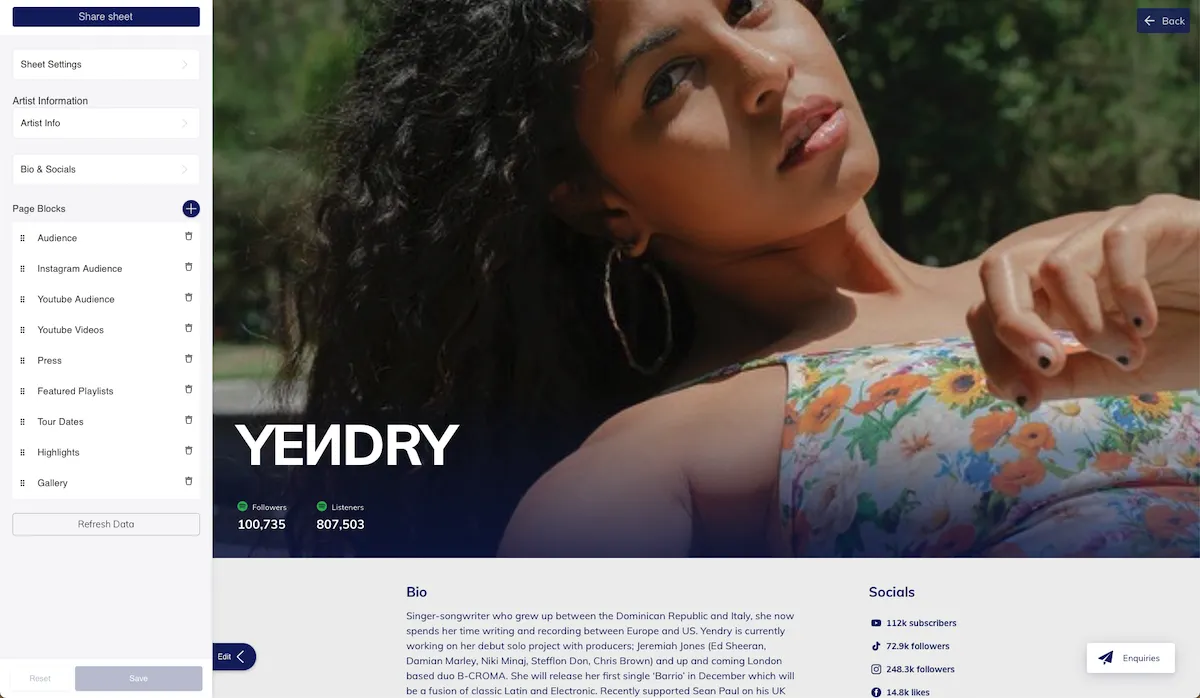A Look at Chartmetric’s Onesheet — The Future Of Dynamic EPKs
[ad_1]
Last year, Chartmetric acquired the appropriately-named Onesheet, a company creating one-sheet summaries (or EPKs) for artists. With Onesheet now relaunched in beta, we take a closer look at how Chartmetric’s datasets are powering these dynamic artist resumes — and what it means for musicians and the broader music industry.
According to Chartmetric, Onesheet is now the ‘outward facing part of its dataset.’ For data-related insights, artist tracking, and showcasing projects, Onesheet is designed to streamline data processing and analysis for decision-makers within the music industry.
Andreas Katsambas, President and COO of Chartmetric, sat down with Digital Music News to talk about the key objectives of Onesheet and who stands to benefit.
Clarifying a clear distinction between the usage of Chartmetric and Onesheet, Katsambas said, “You go to Chartmetric for insights and analytics. You use Onesheet to tell the world who your artist is and what they’re promoting.”
One of the leading data platforms for the music industry, Chartmetric aims to allow professionals to make informed business decisions. Backed by accurate Chartmetric data, every artist’s Onesheet updates stats in real time. It can be created in seconds.
Moreover, Onesheet can pull accurate data from Spotify and the web. This capability allows the platform to streamline workflows for artists and decision-makers.
Katsambas says Onesheet’s integration with major platforms like Songkick allows it to sync live shows automatically. Artist managers can also embed videos, images, and share links from YouTube, Audiomack, SoundCloud, and others.
For artists, Onesheet is a ‘living resume’ geared towards convenience and simplification of top-level stats. For decision-makers in the business, standardizing Onesheet provides quicker and more accurate screening — with Chartmetric data backing up the information. Katsambas says, “It’s an excellent way to screen artists, just by looking at Onesheet.”
Onesheet features artists, albums, projects, events, and festivals. Artists can also ‘Spotlight Release’ upcoming tracks and albums, highlighting priority releases via Onesheet to make the announcements.
Katsambas talked about the strategic advantages for the broader music industry, including quick creation and sharing, extensive customization features, and dynamically updating metrics.
Artists and managers can add and remove sections and metrics tailored to pique the interests of specific decision-makers. Katsambas says, “Coming soon, you’ll be able to change the background colors, the text, the font — it’ll be easier to utilize and more flexible.”
Katsambas also spoke about how these dynamic digital pages take seconds to create. “You can put in anything you want. You can make it as long and extensive as you like. And metrics refresh on a daily basis,” he says.
“Where else can you create online EPKs with metrics updating dynamically? Where else can you add a new release, promote it instantly, and share?”
One-sheet summaries have long been used to visually depict entire careers — at a glance. Historically, the recipients of artists’ EPK one-sheets have included record stores, radio stations, labels, and magazines.
These one-sheets were summaries that took hours to create, detailing new releases, audience reach, and demographics (among many other stats). When the music industry made its digital transition, the need for one-sheets remained, but updating a growing number of stats became laborious.
For managers juggling multiple artists, manually updating streaming stats is a relentlessly demanding project. EPKs can require hours of work every week to tweak, a problem Chartmetric aims to solve.
“Onesheet simplifies the process, makes it easy to share, and evolves the necessary information,” Katsambas explains.
Moreover, if (say) a Onesheet is sent to Spotify today, and the Spotify representative opens it a month from now, they’ll see the data metrics from that morning. Katsambas reveals, “It’s going to be updated at the last minute.”
While the competitive landscape isn’t entirely free of EPK platforms, Katsambas asserts that Onesheet “brings a very different approach.”
Before Chartmetric’s Onesheet, the EPK landscape was undoubtedly different. Sonicbids and Reverbnation also create EPK profiles for artists, but Katsambas insists Onesheet doesn’t see them on the radar, “Onesheet allows you to create EPKs on the fly and share them as well. Those are different use cases.”
Katsambas says Chartmetric’s unparalleled datasets are the armor propelling Onesheet to the front of the race, adding, “We have all the metrics, and Onesheet builds a page instantly. Onesheet brings a very different approach.”
Chartmetric is already working with some early adopters. According to Katsambas, indie record label Roylee Records is already leveraging the benefits of Onesheet. CEO of Roylee Records, Andrew Bonica, explained how Onesheet has become essential to their daily operations. “We love the ability to customize the sheets so we can use multiple sheets per artist, tailored for different purposes such as playlist pitching, tour booking, brand deals, and more. We can be confident that the data in Onesheet is accurate and automatically kept up-to-date without having to do any extra work,” Bonica relayed.
Katsambas also hinted at future features that would further streamline workflows for event managers, booking agents, and marketing decision-makers.
For starters, the integration between Chartmetric and Onesheet will soon become hand-in-glove. “We are currently working towards a closer integration with Chartmetric, and existing users of Chartmetric will be able to benefit from some cool perks, including signing into both platforms with the same credentials,” Katsambas relayed.
Greater capabilities, including customized fields for festivals and events, are also ahead. “It’s about people finding value here and adopting it,” Katsambas said.
Onesheet is free for all account tiers until September 2023.
[ad_2]
